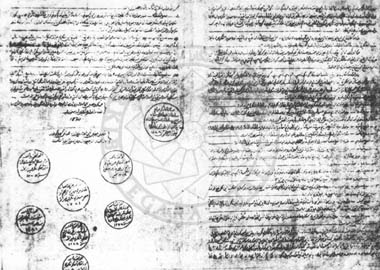 The Pangkor Treaty of 1874 was a treaty signed between the British and the Sultan of Perak. Signed on January 20, 1874 on the island of Pangkor off Perak, the treaty is significant in history of the Malay states as it signalled official British involvement in the policies of the Malays.
The Pangkor Treaty of 1874 was a treaty signed between the British and the Sultan of Perak. Signed on January 20, 1874 on the island of Pangkor off Perak, the treaty is significant in history of the Malay states as it signalled official British involvement in the policies of the Malays.
Perak was a major tin producer throughout the nineteenth century, leading the UK, which had already obtained Penang, Malacca and Singapore, to consider Perak of significant importance. However, local strife collectively known as the Larut War between the local Malay elites and frequent clashes between secret Chinese societies disrupted the flow of tin from the mines of Perak.
In 1871, Sultan Ali, the ruler of Perak died. Due to Perak's complex succession system, Raja Abdullah should have been appointed as the next Sultan of Perak but Raja Ismail was elected instead. At around the same time, two secret Chinese societies known as Ghee Hin led by Chin Ah Yam and Hai San led by Chung Keng Quee constantly waged battle against each other for control of the tin mines. Raja Abdullah later asked for the British help to solve these two problems. In her book "The Golden Chersonese and The Way Thither" (Published 1892 G.P. Putnam's Sons) Victorian traveller and adventuress Isabella Lucy Bird (1831-1904) describes how Raja Muda Abdullah as he then was turned to his friend in Singapore, Tan Kim Ching. Tan, together with an English merchant in Singapore drafted a letter to Governor Sir Andrew Clarke which Abdullah signed. The letter expressed Abdullah's desire to place Perak under British protection, and "to have a man of sufficient abilities to show (him) a good system of government." On the 26th of September, 1872 Chung Keng Quee had already presented a petition, signed by himself and 44 other Chinese leaders, seeking British interference following the attack of 12,000 men of Chung Shan by 2,000 men of Sen Ning. (The Petition.) The British immediately saw this as a great opportunity to expand its influence in Southeast Asia and strengthened its monopoly on tin. As a result, the Pangkor Treaty of 1874 was signed.
Raja Abdullah later asked for the British help to solve these two problems. In her book "The Golden Chersonese and The Way Thither" (Published 1892 G.P. Putnam's Sons) Victorian traveller and adventuress Isabella Lucy Bird (1831-1904) describes how Raja Muda Abdullah as he then was turned to his friend in Singapore, Tan Kim Ching. Tan, together with an English merchant in Singapore drafted a letter to Governor Sir Andrew Clarke which Abdullah signed. The letter expressed Abdullah's desire to place Perak under British protection, and "to have a man of sufficient abilities to show (him) a good system of government." On the 26th of September, 1872 Chung Keng Quee had already presented a petition, signed by himself and 44 other Chinese leaders, seeking British interference following the attack of 12,000 men of Chung Shan by 2,000 men of Sen Ning. (The Petition.) The British immediately saw this as a great opportunity to expand its influence in Southeast Asia and strengthened its monopoly on tin. As a result, the Pangkor Treaty of 1874 was signed.
The agreement dictated:
Raja Ismail did not attend the meeting arranged between Sir Andrew Clarke and Raja Abdullah. Raja Ismail obviously did not recognize the agreement but he had no choice against the alliance between Raja Abdullah and the British. As a result, Raja Abdullah was made Sultan and Sir James W.W. Birch was appointed as Perak's first British Resident after the treaty came to force.
Following this agreement, the British actively became involved in three other Malay states; Negeri Sembilan, Selangor and Pahang. These states along with Perak later became the Federated Malay States.



 12:14 PM
12:14 PM
 usoPkuChai
usoPkuChai

 Posted in:
Posted in: 






0 comments:
Post a Comment